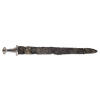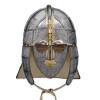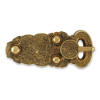Beowulf
Terms, Places, and People:
Beowulf
Wiglaf - Beowulf's relative. A Swedish
warrior of the Waegmunding clan who helps Beowulf slay the dragon.
Hrošgar - king of the Danes;
married to Wealhžeow. Also prominent in Norse tradition.
Wealhžeow - queen of the
Danes; married to Hrošgar.
Wulfgar - the herald of Hrošgar,
renowned for his great wisdom.
Ecgžeow - Beowulf's father who
belonged to the Swedish Węgmunding clan. He joined the Geats after having been
banished for killing the Wulfing Heašolaf, and married a Geatish princess.
Unferš - a thegn of the Danish lord
Hrošgar.
Heorot
Kenning
Scop
Weregild
Thane
Conspicuous consumption
Structure:
The 3 Funerals
Scyld Scefing (lines 152)
Hildeburgs kin (lines 110724)
Beowulf (lines 313782)
The 3 Battles
Grendel
Grendel's Mother
The Dragon
Discussion Questions:
- In what sense is Beowulf a hero? What are the
qualities of the epic hero? How is the heroic ideal represented in Beowulf?
Compare/contrast with the warrior heroes of the Iliad, the Aeneid, and
Gilgamesh.
- What things are valued in the world of Beowulf?
- What is the view of God in this world? Is it a Christian view? Why
or why not? What Christian and pre-Christian (Germanic, Anglo-Saxon, or
epic-heroic) elements can you identify?
- How is evil depicted? Is there a definite distinction between good
and evil? What is the significance of Grendel belonging to the "race of Cain"?
Is there a difference between the evil of Grendel and that of his Mother? How
about the dragon at the end?
- What is the significance of Wiglaf, the loyal warrior in the last
section of the poem?
- What roles do women play in the poem, and what do these roles
indicate about medieval Germanic cultural attitudes/perceptions of women?
- What is the depiction of the relationship between thane and king?
What does each owe the other? What is the significance of treasure/conspicuous
consumption in the poem? Note the emphasis on feasting, comradeship, and song.
Find examples of each. At the beginning of the poem, Beowulf is the thane of his
Uncle, Hygelac; after killing Grendel, he is regarded as the foster "son" of
Hrothgar. What is the importance of kinship in Germanic society?
- What is the effect of the last section, which takes place fifty
years after the action of the first? What elements contribute to the unity of
the poem? Consider, e.g., the two funerals (Shield's and Beowulf's) with which
the poem begins and ends. Consider also that we see Beowulf himself at three
stages of his life: as triumphant hero, aged king, and (in the flashbacks) as a
youth.
The Sutton Hoo Burial Mound
|
|

|
|
Sword from the Sutton Hoo Ship Burial
Suffolk County, England, 7th century, Anglo-Saxon |
|

|
|
Shield from the Sutton Hoo Ship Burial
Suffolk County, England, 7th century, Anglo-Saxon |
|

|
|
Helmet from the Sutton Hoo Ship Burial
Suffolk County, England, 7th century, Anglo-Saxon |
|

|
|
Belt Buckle from the Sutton Hoo Ship Burial
Suffolk County, England, 7th century, Anglo-Saxon |
|

|
|
Impression left by the buried ship at Sutton Hoo
Suffolk County, England, 7th century, Anglo-Saxon |
|
|
Roman/British History Timeline*
- 43 AD: Romans conquered England which had
been controlled by the Celts;
during their rule the Romans
- established cities, roads, and a Roman government
- introduced Christianity
- helped fend off the Picts and the Scots in the north and other invaders from
outside
- 410 AD: Following the
Sack of Rome by
the Visigoths, the Romans abandoned their European holdings, including Britain,
leaving the Celts defenseless against outside invaders.
-
Mid-5th century: Picts and Scots began attacking
Celts who turned to the Jutes
(a Germanic tribe) for support; Danish events in Beowulf.
-
Late-5th century: Angles and Saxons (2 more
Germanic tribes) migrated to Britain. They were not Christian
and had no
need for the types of civilization established under Roman rule. Former Roman
towns were
largely burned or abandoned. Swedish events in Beowulf. -
Late 6th century: St. Augustine of Canterbury introduces Christianity to the new
(Germanic) inhabitants of England.
-
7th century: European monastic scriptoriums began
to preserve and translate manuscripts. The language of the educated elite is
Latin, but throughout Europe people speak and write in their native (vulgar)
languages.
-
8th-10th centuries: sometime during this period the Beowulf poet wrote down
Beowulf's legend,
depending upon older, oral versions of the tale and recasting them in light of
his status as a
representative of the Christian church.
Early History of Britain Timeline
Occupation of Britain (Maps)
|
Line |
Old English |
Modern English |
|
[332] |
oretmecgas ęfter ęželum fręgn: |
asked of the heroes their home and kin
|
|
[333] |
"Hwanon ferigeaš ge fętte scyldas, |
"Whence, now, bear ye burnished shields,
|
|
[334] |
gręge syrcan ond grimhelmas, |
harness gray and helmets grim,
|
|
[335] |
heresceafta heap? Ic eom Hrošgares |
spears in multitude? Messenger, I, Hrothgar's |
|
[336] |
ar ond ombiht. Ne seah ic elžeodige |
herald! Heroes so many ne'er met I |
|
[337] |
žus manige men modiglicran, |
as strangers of mood so strong. |
|
[338] |
Wen ic žęt ge for wlenco, nalles for wręcsišum, |
'Tis plain that for prowess, not plunged into
exile, |
|
[339] |
ac for higežrymmum Hrošgar sohton." |
for high-hearted valor, Hrothgar ye seek!" |
|
[340] |
Him ža ellenrof andswarode, |
Him the sturdy-in-war bespake with words, |
|
[341] |
wlanc Wedera leod, word ęfter spręc, |
proud earl of the Weders answer made, |
|
[342] |
heard under helme: "We synt Higelaces |
hardy 'neath helmet: -- "Hygelac's,
we, |
|
[343] |
beodgeneatas; Beowulf is min nama. |
fellows at board; I am Beowulf named. |
|
[344] |
Wille ic asecgan sunu Healfdenes, |
I am seeking to say to the son of Healfdene |
|
[345] |
męrum žeodne, min ęrende, |
this mission of mine, to thy master-lord, |
|
[346] |
aldre žinum, gif he us geunnan wile |
the doughty prince, if he deign at all |
|
[347] |
žęt we hine swa godne gretan moton." |
grace that we greet him, the good one, now." |
|
[348] |
Wulfgar maželode (žęt węs Wendla leod; |
Wulfgar spake, the Wendles' chieftain, |
|
[349] |
his modsefa manegum gecyšed, |
whose might of mind to many was known, |
|
[350] |
wig ond wisdom): "Ic žęs wine Deniga, |
his courage and counsel: "The king of Danes, |
|
[351] |
frean Scildinga, frinan wille, |
the Scyldings' friend, I fain will tell, |
|
[352] |
beaga bryttan, swa žu bena eart, |
the Breaker-of-Rings, as the boon thou askest, |
|
[353] |
žeoden męrne, ymb žinne siš, |
the famed prince, of thy faring hither, |
|
[354] |
ond že ža ondsware ędre gecyšan |
and, swiftly after, such answer bring |
|
[355] |
še me se goda agifan ženceš." |
as the doughty monarch may deign to give." |
Summary of Chapters**
PROLOGUE:
Scyld Scēfing, an abandoned child, came to Denmark by sea and became a strong
king, founding the ruling house of Denmark. His son was Beo(wulf) [NOT the hero
of the poem], a strong king. The funeral for Scyld Scēfing is detailed.
CHAPTER 1:
Scylds descendant Hrothgar is a mighty king who built a magnificent mead-hall,
Heorot. The singing in the hall stirs up the evil monster, Grendel.
CHAPTER 2:
Grendel goes on the rampage, kills thirty men, and rules Heorot at night for 12
years. The story spreads across Scandinavia. The Danes sacrifice to the gods.
CHAPTER 3:
Beowulf hears the story, and takes 14 of the bravest Geats [from southern
Sweden] to Denmark. He and his group are met by guards.
CHAPTER 4:
Beowulf explains his mission, and the guards accept his story, acknowledging
Beowulf's impressive stature as a 'complete' warrior, and point him to Heorot.
The guards tells him his ship will be 'kept safe' until Beowulf makes good his
words... meaning that he should be who he says he is, if he wants to return home
with his ship, or perhaps return at all.
CHAPTER 5:
At Heorot Beowulf declares his arrival to Wulfgar who urges Hrothgar to listen
to Beowulf.
CHAPTER: 6
Beowulf announces that he has come to kill Grendel.
CHAPTER 7:
Hrothgar tells Beowulf of Ecgžeows (Beowulfs father) debt to him, and
Grendel's atrocities.
CHAPTER 8:
Unferth insults Beowulf. Beowulf boasts.
CHAPTER 9:
Beowulf says that if Unferth were such a great warrior, Grendel would not be
plaguing the Danes. Weltheow, the Queen, serves ale to the men.
CHAPTER 10:
Beowulf prepares to fight Grendel by removing and putting away his armor.
CHAPTER 11:
Grendel attacks, and eats one Geat.
CHAPTER 12:
Beowulf and Grendel fight. Beowulf tears off Grendels arm. Grendel departs
without his arm.
CHAPTER 13:
Beowulf compared to 'good' king Sigemund and 'bad' king Heremod.
CHAPTER 14:
Hrothgar praises Beowulf who wanted to be better. Unferth shuts up.
CHAPTER 15:
Hrothgar gives presents to Beowulf and his men.
CHAPTER 16-17:
Hrothgars scop (bard) sings the Battle of Finnsburg.
CHAPTER 18:
History of the necklace. The queen, Weltheow, asks Beowulf to protect her son.
She is aware that her husband is older, her sons still young, and that there are
those who would want the throne. Danes sleep in Heorot.
CHAPTER 19:
Grendel's mother comes and snatches the 'best of Danes.' The narrator observes
that a female, even a female monster, must flee from warrior's weapons.
CHAPTER 20:
Hrothgar tells of Grendel's mother and her lair in a nearby, 'bottomless' lake.
CHAPTER 21:
At the water's edge, purpose of revenge, 'to obtain rest from mourning.'
CHAPTER 22:
Beowulf sinks for hours and then begins the battle with Grendel's mother, and
cuts off her head with a giant's magic sword.
CHAPTER 23:
Beowulf cuts off Grendel's head, carries it to the surface, four men carry it on
their spears to Hrothgar's hall.
CHAPTER 24:
Beowulf recounts his battle, gives Hrothgar the golden sword hilt the blade of
which melted as he cut off Grendel's head. Hrothgar begins advice to Beowulf.
CHAPTER 25
Hrothgar's advice concludes. Beowulf a hero, Unferth gives him his sword
Hrunting in apology for insult.
CHAPTER 26:
Beowulf and Hrothgar give parting comments. Beowulf pledges to help Hrothgar and
his son. More gifts given.
CHAPTER 27:
The Geats return home with a treasure laden ship to Hygelac and Hygd. Anecdote
of Thrith.
CHAPTER 28:
Queen again serves drinks to men. Beowulf gives quick summary of battle with
Grendel. Then he talks of politics- marrying off Hrothgar's daughter, Freaw, to
Ingeld for peace, which Beowulf feels won't work.
CHAPTER 29:
Continues Beowulf's tale. Ingeld [a Hathobard] & his men will fight with the
Danes Then Beowulf continues his account of his battle with Grendel.
CHAPTER 30:
Beowulf recounts how he kills Grendel, and then his mother, and how he earned
treasure for each of those battles.
CHAPTER 31:
Beowulf takes the treasure that he has earned and passes it on to his king.
Armor and [4] horses for Higlac, necklace and [3] horses for Higd. Note: We
learn that Beowulf was scorned as a boy, thought of as 'slow' and lazy. Higlac
gives him land and houses as thanks for a loyal follower of exceptional service.
After Higlac dies and his son, Herdred, is killed by the Swedes, Beowulf becomes
the king for fifty years.
Then a thief finds a dragon guarded treasure and steals a cup. The dragon awakes
and is enraged at the theft and wants to 'take it out' on Beowulf's land and
people.
CHAPTER 32:
Thief sees the sleeping dragon, takes one cup and FLEES. Flashback/recounting:
The treasure belonged to a noble race, now wiped out by battle and the passage
of life. The treasure is guarded by warriors until a last warrior is left. The
warrior 'curses' the treasures, that 'no one living can enjoy them.' Eventually
he dies and a dragon takes up residence guarding the treasure [from the living.]
Thief gave cup to an angry master. Dragon pursues thief in vain..waits until
dark [like Grendel] for his revenge.
CHAPTER 33:
Dragon goes out and burns lots of dwellings, including Beowulf's hall. Beowulf
wonders if he has broken God's laws somehow makes shield of iron. Prediction of
his death. Recounts the highlights of his past: Higlac killed by Frisians. Higd
[Higlac's wife] offers him crown- He instead supports Herdred who protects
Swedish exiles. An angry Swedish king Onela comes with his army and kills
Herdred and leaves.
CHAPTER 34:
Beowulf, now king, supports Swedish exiles with army and gold until Onela is
killed for killing Herdred. Then Beowulf defeats all contenders until the
dragon. Now old age rests on him. [line 2421] He recounts how Hrethel took him
in, loved him like his own three sons: Herbald, Hathcyn, and Higlac. But Hathcyn
kills Herbald with an arrow while hunting. ***Hrethel despairs, losing an heir,
and no revenge to be taken.
CHAPTER 35:
Hrethel dies. Hathcyn [king] killed by Swedes, but immediately revenged. Beowulf
becomes a strong power for Higlac until Dagref the Frank kills Higlac and loots
his corpse. But Beowulf catches Dagref and crushes him to death before he can
leave with the loot. *End of Beowulf's recounting of his past. Beowulf says
farewell, will use weapons because of dragon's poisonous, flaming, breath.
Beowulf goes into lair and battle... dragon charges, begins to melt shield.
Beowulf knows Fate against him. Sword breaks-Beowulf stares at death. All but
one of Beowulf's trusted followers have fled for their lives.
CHAPTER 36:
Wiglaf supports Beowulf with special armor and sword. He calls to the other
trusted followers to support their old king who "doesn't deserve an end like
this." Wiglaf rushes to aid Beowulf and leaves behind his shield. Beowulf, with
one more effort, mortally wounds the dragon, with his stump of a sword but the
dragon bites Beowulf in the neck.
CHAPTER 37:
Wiglaf wounds the dragon with his sword sufficiently for Beowulf to kill it with
his dagger. Beowulf begins to die from the poison in his neck. Has no son to
leave armor to. Asks Wiglaf to bring him treasure to see before he dies.
CHAPTER 38:
Wiglaf goes in and retrieves treasure for Beowulf who sees it and thanks God for
it. Beowulf to be burned [cremated], wants a tower built and gives helmet and
mail shirt and leadership to Wiglaf, last of his 'kin.'
CHAPTER 39:
Wiglaf left alone with Beowulf's corpse. Beowulf's men who fled come out; Wiglaf
brands them as cowards and shame will come to them and all their kin.
CHAPTER 40:
Messenger sent to the Geats with the news, Beowulf's dead; Wiglaf is with him.
He recounts the peoples that will war with the now leaderless Geats: the Franks
that Higlac began raiding and whom Beowulf held off. Also Swedes whom Hathcyn
attacked [Ongentho] but got ambushed by. But Higlac showed up to attack the
Swedes on the other side.
CHAPTER 41:
Ongentho wounds Wulf, is killed by Efor, Wulf's brother, with a battleaxe.
Everyone is going to be after the Geats.' -End of list of enemies.- It is
decided that all the 'treasure' should be burned with Beowulf. The Geats face a
gloomy future. The men cast the dragon, 50 feet long, into the sea, Beowulf
lying dead. Hoard has 'spell'; only a few can see it.
CHAPTER 42:
Lots of philosophy- 'Men destined to die' vs God's will. Wiglaf talks, takes
seven nobles to see and get treasure to burn with Beowulf. (Beowulf worth more
than treasure.) They roll the dragon off the cliff into the ocean.
CHAPTER 43:
Funeral pyre lit and Beowulf burned. OLD WOMAN predicts that the Geats will be
overrun. She seems to know 'what goes round comes around' and 'they'll get
theirs.' They build the tower and twelve Geats ride around the tower praising
Beowulf, best of kings.
* Timeline by
J. Lawrence with additions and corrections by R. Kelley
** by
Teacher's Lesson Plan with additions and corrections by R. Kelley




